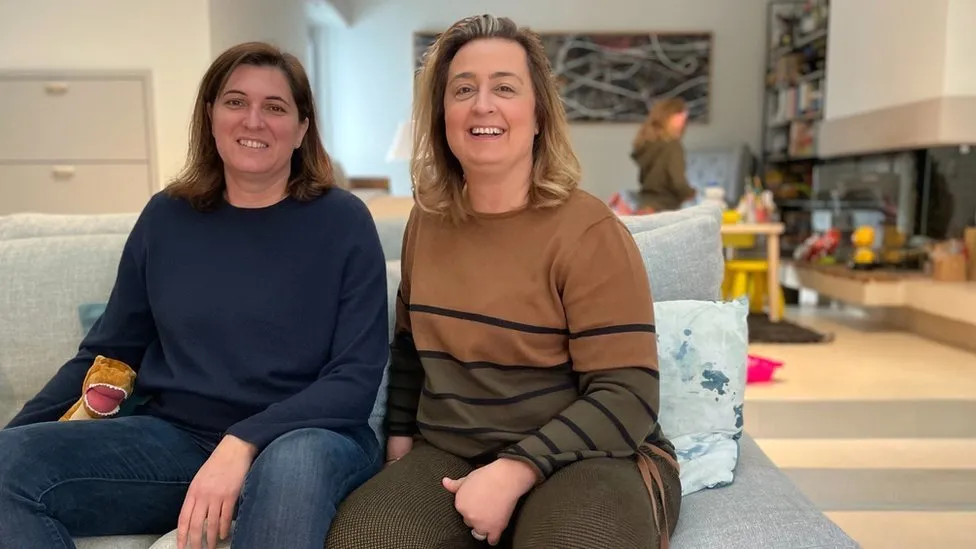Greece on the brink of legalising same-sex marriage
In her garden in northern Athens, four-year-old Niovi plays make-believe, selling cakes from her imaginary shop.

For her two mums, Christina and Victoria, their dream may soon become real, as Greece stands on the brink of legalising same-sex marriage.
Parliament will vote on the bill, introduced by Prime Minister Kyriakos Mitsotakis, on Thursday. Facing dissent from members of his own centre-right party, he will need to rely on support from the left-wing opposition to get it through.
Christina and Victoria will be there inside the chamber, willing it to pass. Two years ago, they returned to Greece from the UK, where they had moved for work - and to live their relationship freely.
They married in the UK and Niovi was born there. If the law passes, they plan to have their marriage recognised under Greek law.
'I have no say'
After Niovi's birth in London, they tried to register her at the Greek embassy, but were rebuffed. "The commentary was, 'You should have thought before having her'," Christina recalls.
"It was awful, I cried in the car for 45 minutes, I couldn't stop - it still brings bad memories," Victoria says, welling up with tears. "It's like being rejected by your country."
Without legal recognition for their marriage in Greece, only Victoria, who gave birth to Niovi, is accepted as her mother, even though the egg was from Christina.
At school, she has no say over decisions and when Niovi has been admitted to hospital, Christina has been barred from entering her room.
"My biggest fear is that if anything really bad happens to Victoria and she dies, our child instantly goes to social services, who then see if any of Victoria's relatives want to adopt her," she says.
"If they don't, she goes into an institution. I have no say. So the child wouldn't just lose one mother, she'd lose both of us."
Opposition by the Church
Fifteen of the European Union's 27 members have already legalised same-sex marriage. It is permitted in 35 countries worldwide.
Greece has lagged behind European neighbours largely because of opposition from its powerful church. If the law passes this week, it would become the first Christian Orthodox-majority country, and the first in Europe's southeast, to have marriage equality.
Same-sex couples would also be legally allowed to adopt children but not to have a baby through a surrogate - a recourse that is only legal here for heterosexual couples who have a medical need for assisted reproduction.
"Greece geographically is in the southeast, but culturally and politically it belongs to the West," says Alex Patelis, the prime minister's chief economic advisor and a member of the committee that drafted the marriage bill.
Mr Mitsotakis, recently storming to re-election, faces a weak opposition that has left him the space to tread onto their political turf without jeopardising his own position.
Mr Patelis says the bill is a cornerstone of the prime minister's beliefs: "It's often thought that human rights and equality are the purview of the parties of the left. This is coming from a centre-right party - and it's important to recognise that equality under law and individual rights are also the ideology of the right."
But Greek society is split. A recent poll for Proto Thema newspaper found 55% in favour of same-sex marriage and an even slimmer majority backing adoption.
Up to 50 of Mr Mitsotakis's 158 MPs are expected either to vote against the bill or to be conveniently absent from the chamber, meaning they can duck the vote.
A letter by the Church of Greece opposing the move was read out in morning mass across the country earlier this month, condemning what it said would "promote the abolition of fatherhood and motherhood… and put the sexual choices of homosexual adults above the interests of future children".
One of the most outspoken prelates has been Bishop Seraphim of Piraeus. At the city's Agii Anargiri Church, we watch as he leads a packed service, with worshippers in their Sunday best kissing icons and bowing heads.
He recently warned that he would block MPs who back the bill from his church, adding it would be preferable if they had not been born.
And, he said, he would refuse to baptise children of same-sex couples "to help them understand that what their guardians are doing is a sin."
Outside parliament on Syntagma Square, opponents gather to protest against the bill, beneath banners reading "No children for perverts" and chanting "Take your hands off our kids".
A video shows images including religious icons and, oddly, Bill Gates. Conspiracy theories about a new global order being imposed on Greece have blended with pious Greeks who believe their traditions are being destroyed.
"The Bible says marriage is between a man and a woman - and anything else is a big sin," says Rallou Perperidou.
"Like Sodom and Gomorrah, God destroyed people practising homosexuality. God will forgive them if they accept what they do is wrong and denounce it."
Protesters hold a banner that reads "Take your hands off our kids. There's only one family, the traditional one."
Kyriaki Chantzara, 38, is at the protest with her sister, who is expecting her tenth child.
"Homosexual people cannot give the right example for children because we think the existence of a female and male example is crucial to them. It is a human right for every child to have a father and a mother," she says.
Back in northern Athens, four-year-old Niovi is practising her English with nursery rhymes. Her mums help as she reads "Hickory Dickory Dock, the mouse ran up the clock…"
As time ticks towards the parliamentary vote, the women say their excitement is building. "I'm amazingly happy about it," says Christina.
"It's the start of accepting diversity in general as a country and accepting that all people have equal rights. And for us it will mean reality, because I am Niovi's mother, and this should be supported by the law. The legislation will bring truth to the reality."
-bbc






